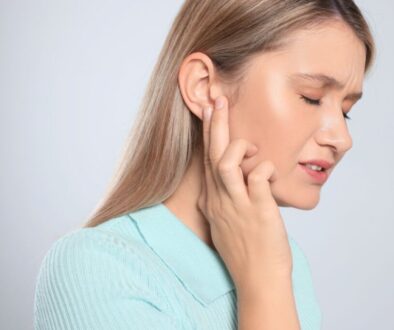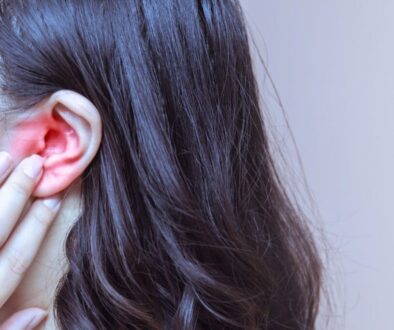What Does It Mean When You Have Sore Throat and Ear Pain?

Published April 22, 2022
A sore throat is usually nothing to worry about. While an ear pain typically goes away on its own. But if you have both sore throat and ear pain at the same time, it’s generally a sign of an underlying medical condition.
The Connection Between Sore Throat and Ear Pain
Though they’re located close to each other, not a lot of people know that the ears and throat are directly connected. But they are – by way of the Eustachian tube. This narrow passage traverses through your nasopharynx and drains fluids from your ears down to your throat. It does this to keep the pressure inside your ears equal to the pressure in the environment.
Under normal circumstances, the Eustachian tube drains your ear fluids without any hitch. But if infections occur at either end of the Eustachian tube, the viruses and bacteria may also travel the length of this narrow passage.
So if your ear gets infected, the infection can travel through your nasopharynx and down to your throat. And in case of throat infections, the viruses and bacteria can also go up and infect your ears.
Since the Eustachian tubes also pass through the back of your nasal cavities, the viruses and bacteria from your nose may also reach your ears and throat.
Common Causes of Sore Throat and Ear Pain
As mentioned, having both sore throat and ear pain can be a sign of an underlying medical condition. Some of the most common ones are:
1. Common Colds
Viral and bacterial infections can cause your nasal cavities to swell up leading to colds. Though these viruses and bacteria enter your nose, they can travel to your throat through the eustachian tube. That’s why if you have colds, you are also likely to have a sore throat.
The fluids in your middle ear also tend to accumulate during a cold. This build-up increases the pressure in your eardrums leading to pain and infection.
Aside from sore throat and ear pain, other symptoms of common colds include:
- nasal congestion
- runny nose
- sneezing
- low-grade fever
- slight body ache
- a general feeling of being unwell
2. Flu
As its name suggests, flu is caused by the influenza virus which travels through the air in droplets. It affects the nose, throat, and lungs. Like the common cold, it can also cause inflammation in your eardrums causing ear pain.
Some of the symptoms to watch out for are:
- fever
- chills
- fatigue
- runny nose
- headache
- shortness of breath
- dry cough
- body aches
- eye pain
3. Sinus Infection
Sinusitis happens when the tissues lining your sinuses are inflamed. It’s commonly caused by viruses, bacteria, or fungus. Though in some cases, it can also be due to growths or structural problems in the nasal cavities.
Since sinus infections also cause post-nasal drips, the viruses and bacteria can also reach your throat and irritate it. It can also cause your ear fluids to get trapped behind your eardrums causing ear pain.
Symptoms of sinus infection include:
- stuffy nose
- headache
- facial pain and pressure
- post-nasal drips
- cough
- bad breath

4. Tonsillitis
Tonsillitis is an inflammation of the tonsils, the bell-shaped masses of tissue at the back of your throat. It’s usually caused by a virus though some types of bacteria may also cause your tonsils to swell up.
Since it’s at the back of your throat, tonsillitis can cause severe throat pain. Some people even lose their voices. It can also cause pus to accumulate around one of your tonsils causing ear pain when swallowing.
Other symptoms of tonsillitis include:
- difficulty swallowing
- swollen and tender tonsils
- headache
- loss of appetite
- a white or yellowish coating on your tonsils
- fever and chills
- muffled voice
5. Allergies
Aside from irritating your throat, some types of allergens also cause inflammations in your nasal cavities. This leads to post-nasal drip which, as you already know, helps transport viruses and bacteria from your nose to your throat.
These inflammations also prevent proper drainage of ear fluids to your throat. This leads them to accumulate in your ears thus causing ear pain.
Allergies may also manifest in the following symptoms:
- stuffy or runny nose
- watery eyes
- constant sneezing
- difficulty breathing (in certain cases)
6. Irritants
Irritants like fumes, chemicals, and smoke not only affect your eyes and nose. They can irritate your throat too. When this happens, your ear fluids won’t properly drain leading to increased pressure and pain in your eardrums.
Some of the telltale signs that you’ve inhaled an irritant are:
- extreme itching
- skin redness
- a burning sensation in the nose and throat
- swelling in the face, especially the eyes
The most common irritants you’ll encounter are:
- sawdust
- paint thinner
- gasoline
- smoke
- cement
- oven cleaner
- industrial bleach
7. Tooth Infection
A tooth infection caused by a dental abscess can be very painful. That pain in your jaw will eventually extend to your ears, especially when swallowing. The abscess can also cause swelling in your lymph nodes leading to a sore throat.
Some of the most common signs of tooth infection are:
- pain when chewing or swallowing
- sensitivity to heat and cold
- fever
- swelling in the face, particularly in the cheek area
Remedies and Treatments
The first step to treating sore throat and ear pain is to figure out what causes it. Until you can get rid of the underlying medical condition, you’ll have to suffer from it a little while longer.
Once you’ve figured out what’s causing the discomfort in your throat and ears, here are some remedies you can try:
Home Remedies
- Get plenty of rest.
- Keep yourself hydrated.
- Use an air humidifier to keep your nasal cavities moist.
- Use a neti pot to flush the mucus out of your nasal passages and unclog them.
- Suck on lozenges or sore throat candies.
- Use a sore throat spray.
- If your ear pain and sore throat are caused by allergies, try taking over-the-counter antihistamine tablets.
- Gargle with saltwater, especially for dental infections.
- Take over-the-counter flu and fever medications.
- Take a steam bath.
- Eat vitamin C-rich foods.
- Take probiotics with strains formulated for ear, nose, and throat health.
Medical Treatments
If your throat and ear pain are due to a more serious medical condition that home remedies can’t get rid of, your doctor may recommend more intensive treatments like:
- nasal or oral corticosteroids
- prescription allergy medications
- sinus surgeries like septoplasty, turbinate reduction, and balloon sinuplasty among others
- tonsillectomy (surgical removal of the tonsils)
When to See a Doctor
For common illnesses like flu, colds, and allergies, the symptoms usually go away on their own. But if the pain in your ears and throat becomes chronic or has become so severe that it affects your day-to-day activities, don’t hesitate to visit your doctor.
After all, home remedies can only do so much. If you don’t want your symptoms to get worse, it’s always a good idea to get help from a qualified medical professional.
Benefit From The Latest Advancements In Probiotic Science With Bionaze
Bionaze is a proprietary blend of probiotics proven to promote ear, nose, and throat health, improve digestion, and support your immune system. The active ingredients BLIS K12, and BL-04 are considered among the best probiotics according to science.
Get 25% Off Your First Order when you use BIO25 at checkout!

This Content Has Been Reviewed For Factual Accuracy
This content has undergone thorough fact-checking by our team of internal experts. Learn more about the meticulous editorial standard for our website here.
ADVERTISEMENT

About The Author
Judy Ponio is a professional writer based in the Philippines. Her commitment to communicating factual content in when writing is unmatched. She works hard to cross check reputable sources to ensure her work uses accurate facts.




